Don’t Be Fooled By “Official” Developer Sites: 7 Tell-Tale Signs To Uncover The Knock-Offs
June 26, 2021
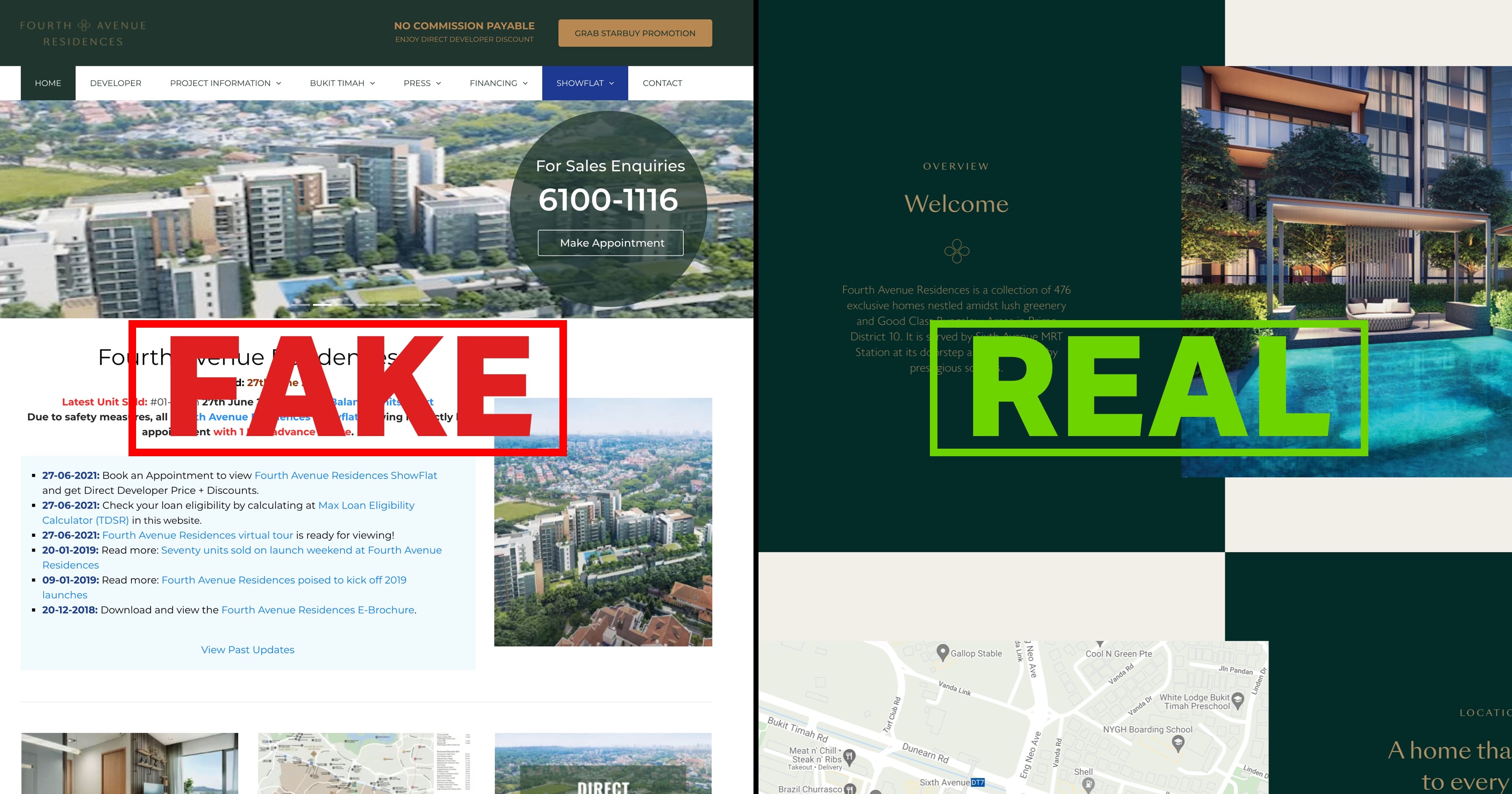
It’s a common source of headaches for home buyers: you do a web search for a new launch condo, and you get a slew of pages all labelled “official”. Clicking on one takes you to a minefield of misinformation, irrelevant pages, or sometimes even misleading prices. This has gone on for some time, despite the best efforts of some developers to police it. In this article, we look at why it happens, and how to spot the real official website:
So many readers write in because they're unsure what to do next, and don't know who to trust.
If this sounds familiar, we offer structured 1-to-1 consultations where we walk through your finances, goals, and market options objectively.
No obligation. Just clarity.
Learn more here.
Why are there so many “official” pages for new launch condos?
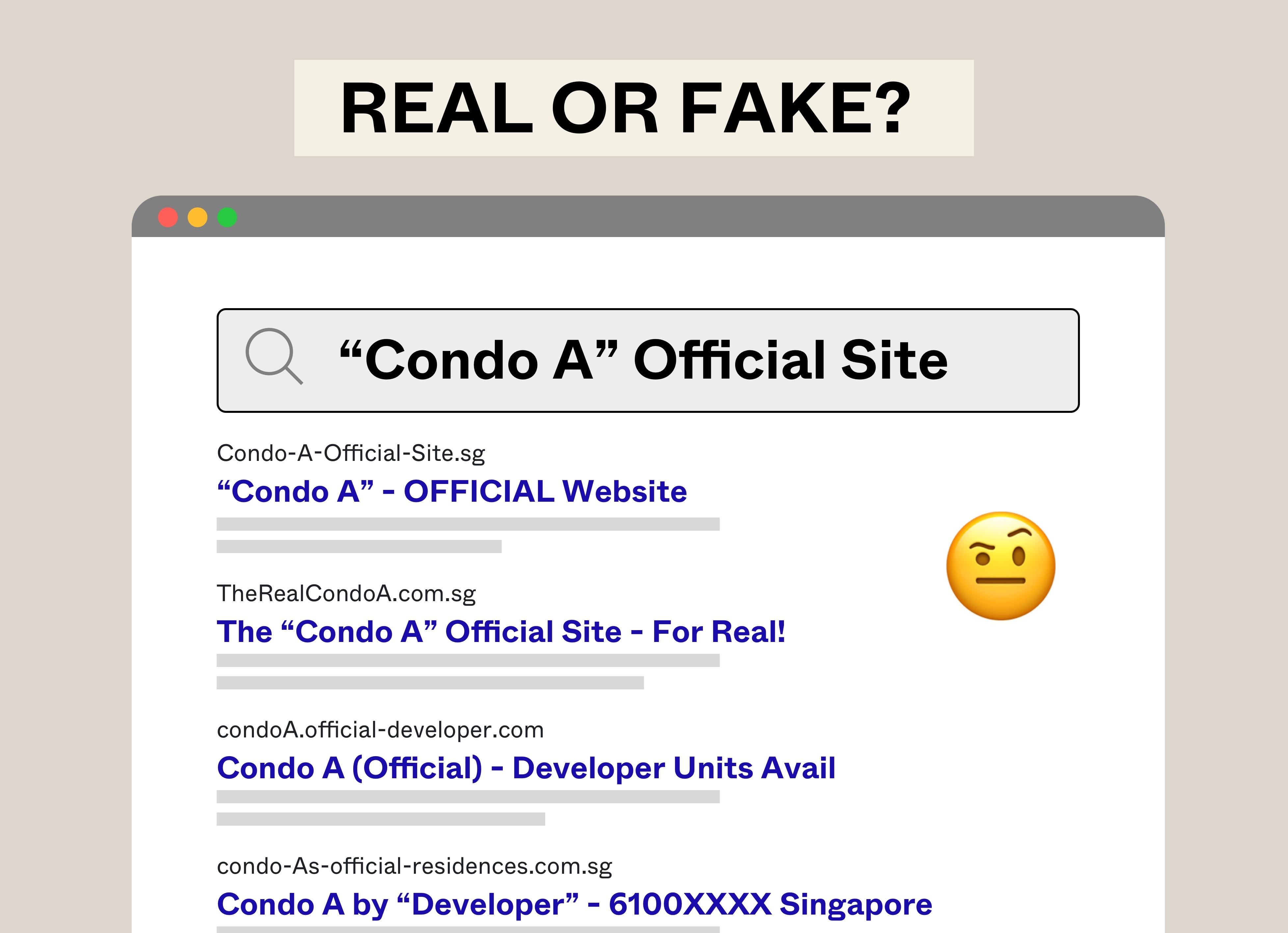
The answer is that there isn’t. Developers only put up a single official page; but some agents label their website as “official”.
According to one realtor we spoke to, who asked to remain anonymous, the practice happened because the online market place became overcrowded. He says:
“These days it’s very fast to create a website. It’s not like last time when you needed a web developer; you can create a site in five minutes.”
(We don’t want to name any specific companies, but a simple Google search will show hundreds of services offering this).
*You might even notice that the designs of these sites have an uncanny resemblance to these “official” developer websites
So the moment a new launch comes up, a multitude of websites will rush to announce it. This makes it hard for any one of them to stand out. As a result, some realtors decide to attach the word “official” to it.
It also became a common practice because many developers didn’t mind…at first.
Another agent explained that, back in the 2010’s, agents could name their page “official” and expect few or no repercussions:
“Most developers back then were more ‘hands-off’. Even if agents used words like ‘official’, when actually it wasn’t, some developers didn’t seem to mind. The feeling was that, as long as these agents help to promote the property, what is the harm?
But in the past few years, developers have become much more sensitive.”
The agent opines that the final straw wasn’t actually a fake “official” site, but a Facebook ad. This was the infamous Midwood condo ad in 2019.
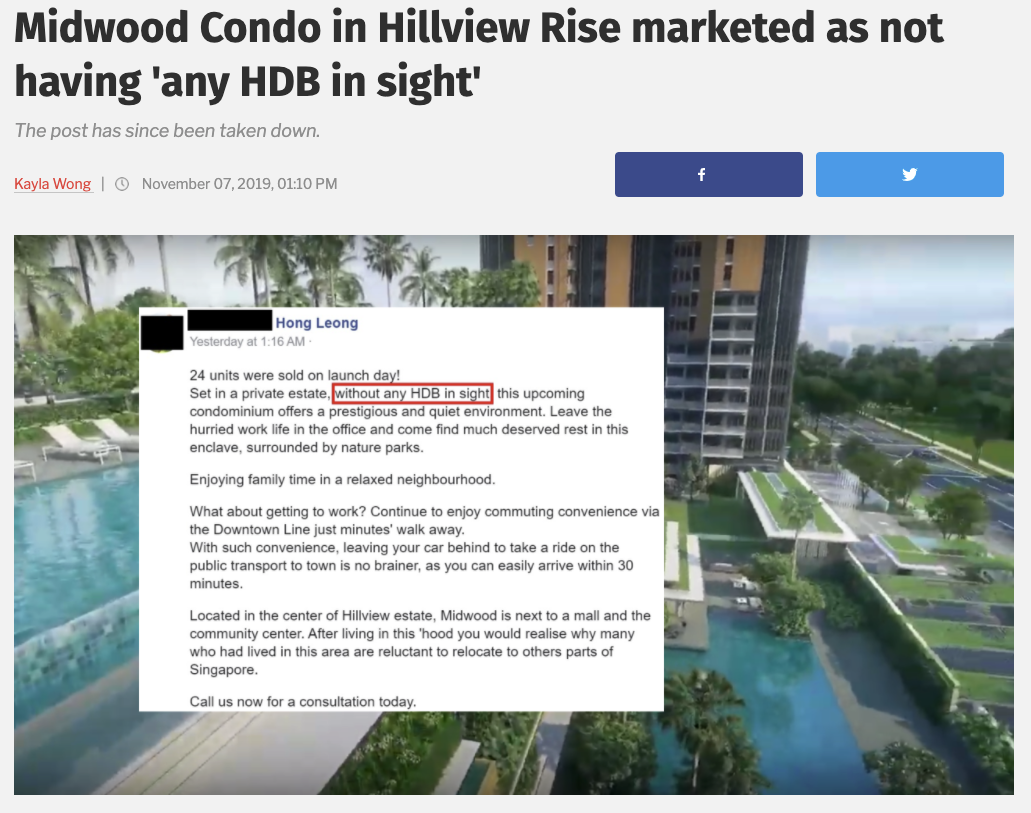
At the time, an ad by a realtor stated that Midwood condo had “no HDB flats” in sight. This raised issues of elitism, and Hong Leong Holdings issued a statement clarifying they weren’t behind it.
“It showed that whatever wordings agents write online can end up being a bad reflection on the developer. And it will be trouble if someone uses wording like that on a so-called ‘official’ website.”
Developers now police these issues with varying intensity, and there are fewer agents gutsy enough to label their sites “official”.
So far however, we haven’t heard of legal action being taken over this. This could result in some agents deciding to go ahead with it with the “official” label, as it’s easy to apologise and tweak the page later.
Problems with the fake “official” pages
In most cases, there’s no harm other than wasted time. However, home buyers should take note of a few issues:
First, many of these pages advertise lower prices, to draw you in. As we’ll show below, official developer pages almost never mention pricing; and what you see is often a lower attractive estimate by the seller to lure you in.
Second, these pages may stretch the truth regarding distances to MRT stations, schools, etc. You should probably double check the distance using Google maps, or by referencing more than one website.
The third, and most dangerous issue, is that inexperienced home buyers may come under the impression that the agent they contact is the final authority (because the agent’s contact was on the “official” condo page). They may end up taking the agent’s word that a given price is the lowest a developer will go, or trusting that certain units are discounted (when they haven’t been).
We’ve heard of many buyers who’ve gone all the way, only to realise at the end that the agents serving them weren’t from the official developer sales team. Consumers reach out because of the status of the developer, and while it is in a grey area – it can be misleading to those who are new to the property scene.
How to differentiate between a real and fake “official” developer websites
Example 1: Look at the domain name
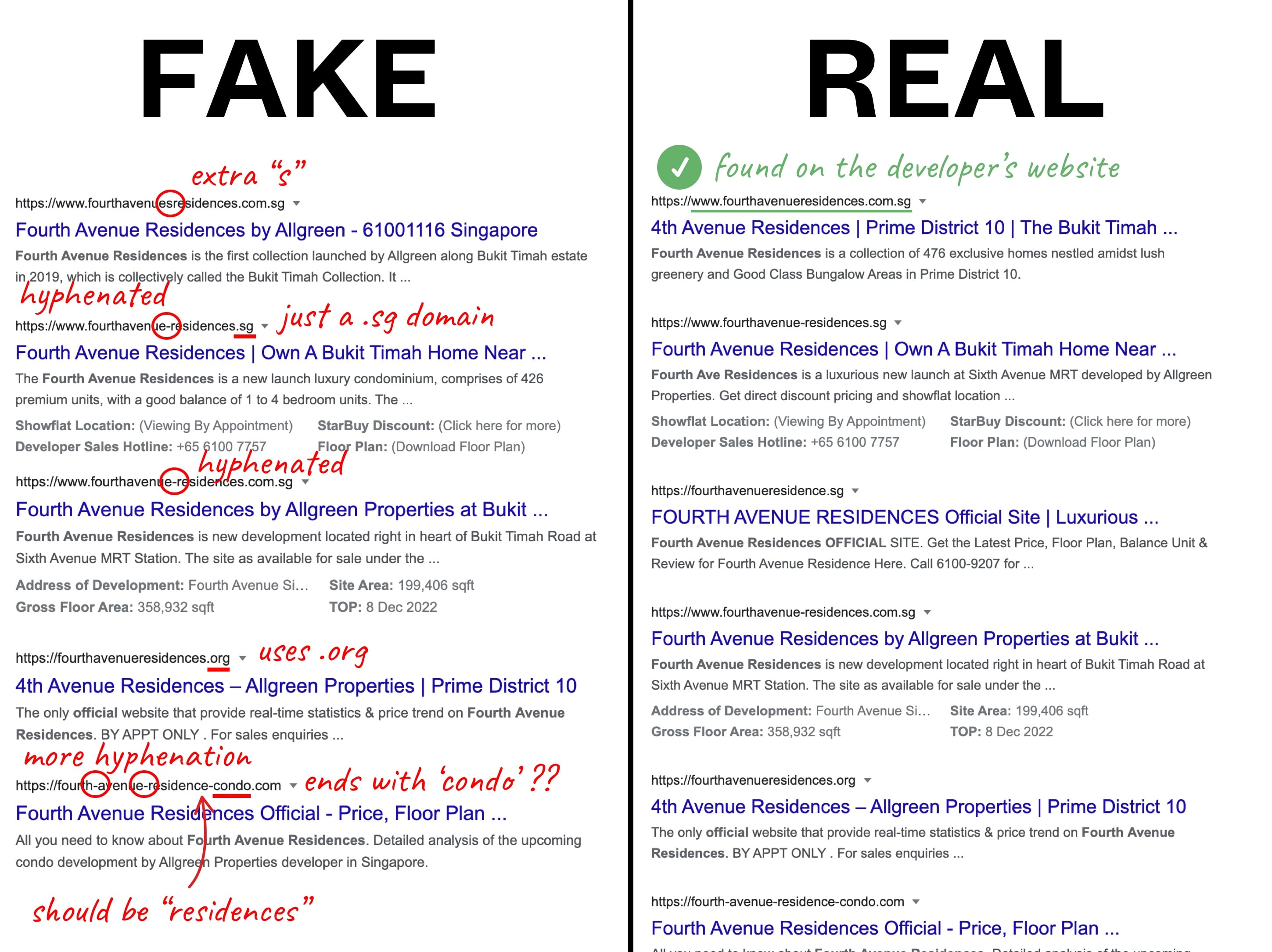
There are plenty of convincing looking “official” sites for Fourth Avenue Residences, such as the above. It’s tough for casual consumers because most people would think that the real site would rank first on Google. Alas, that is often not the case. Note that none of them on the left is the developer’s site.
So an easy tell (most of the time) is to look at the domain name. Typically, you’d find that the real developer site would be the name of the development followed by .com.sg. This is because the developer will obviously be the one that has decided on the name, and will be able to purchase the correct domain for it first.
Which is why once this is bought you’d find all sorts of variations of the different “official” pages – .sg, and extra S in the project name, the word official, .org, and more hyphens to differentiate.
That said, this definitely isn’t a foolproof way, as the problem starts when the project is a common word – hence even the developer isn’t able to purchase the domain name with a .com.sg. (a good example is Amber Park). There are also cases where the developer has not bothered to set up a website, and it’s the game of fastest fingers first for the agent to do so.
So read on, for other tell-tale signs.
Example 2: Look at the real developer websites
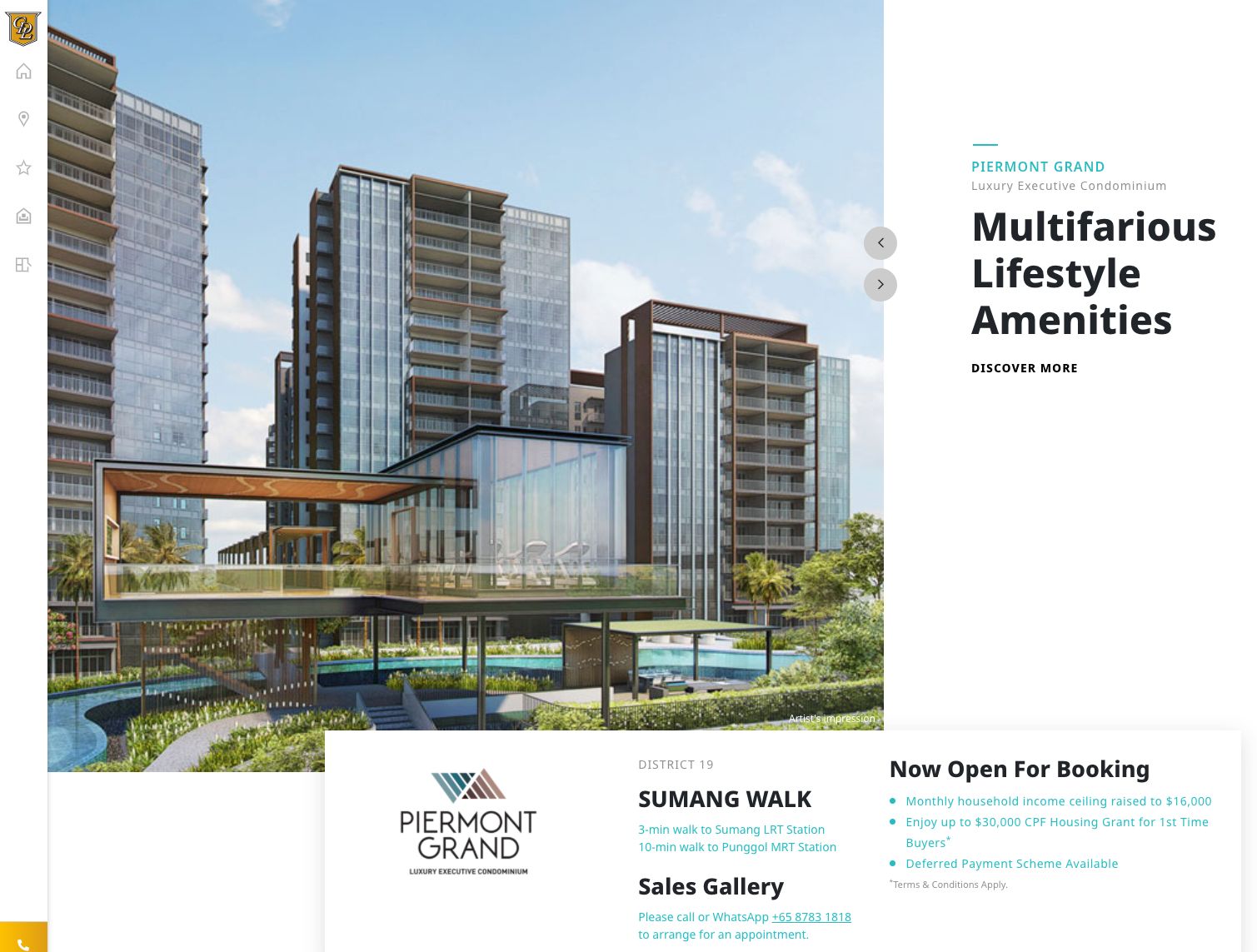
The real CDL site for Piermont Grand is actually here.
To familiarise yourself, take a look at some of the official developer websites – they will have a certain quality in the way that it is designed. Plus, animations are usually smooth and the site will have a pleasant surfing experience.
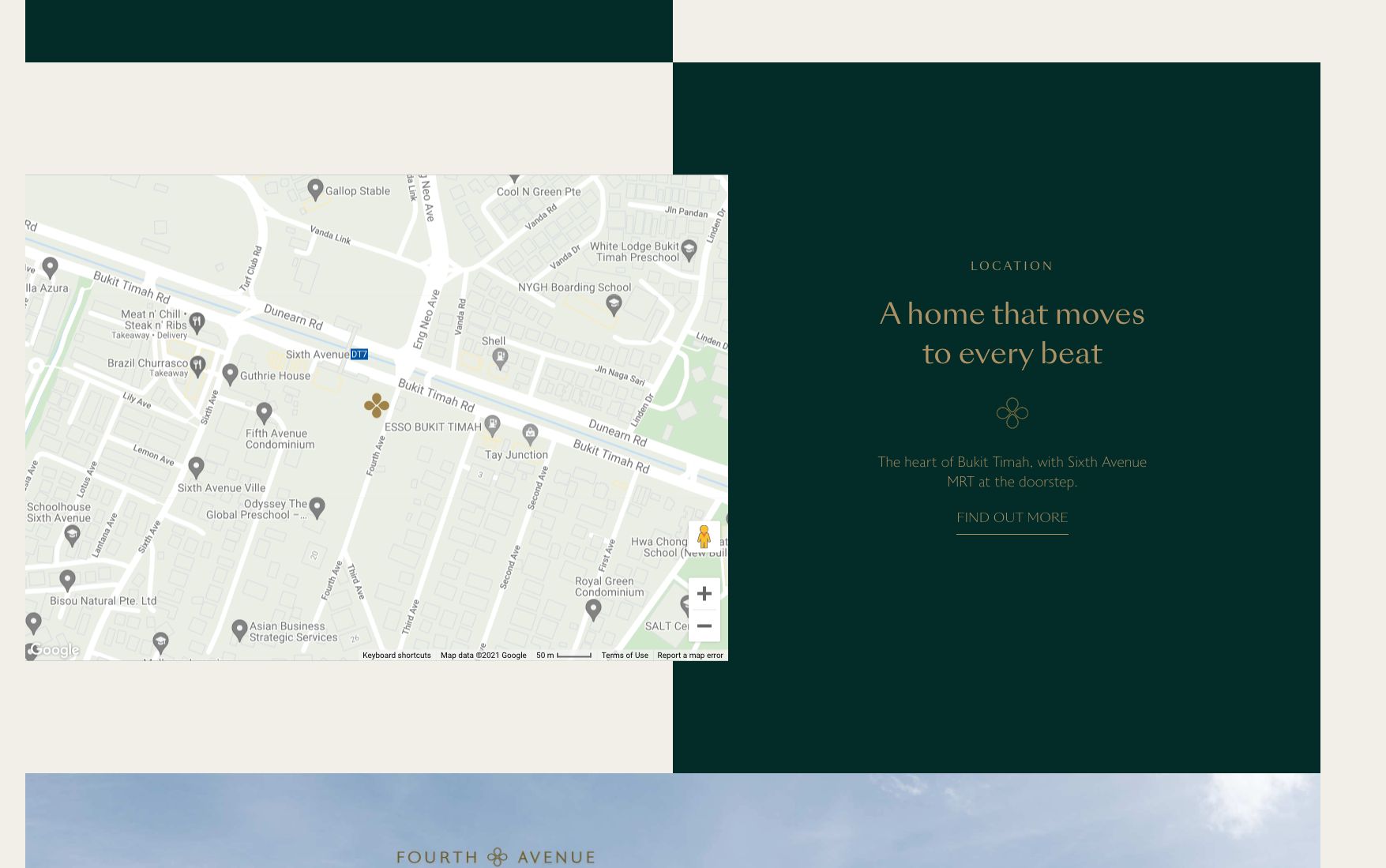
Some may even have a high quality video being played at the beginning.
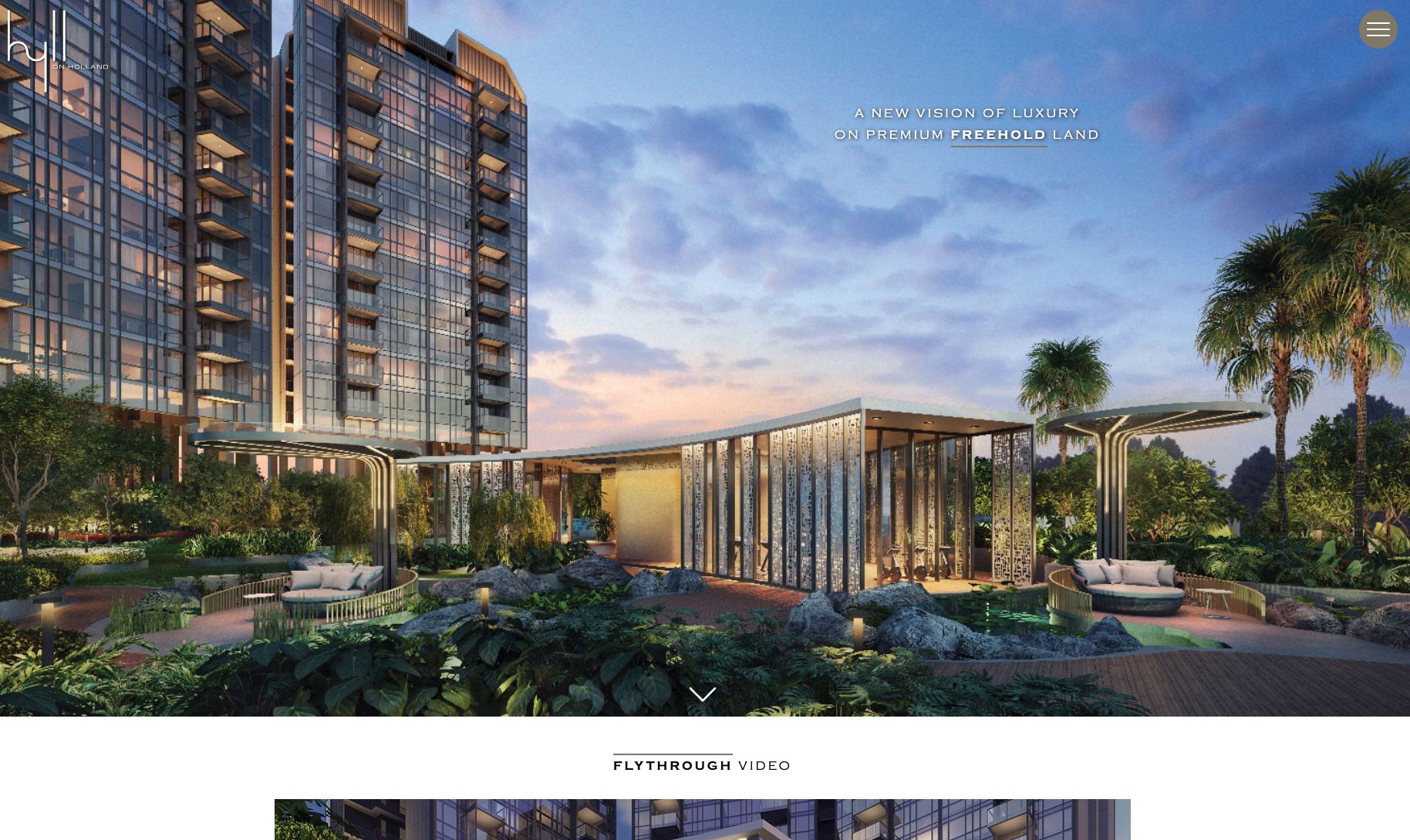
While others may be well-designed and clearly laid out.
Contrast this to some of the “official” sites:
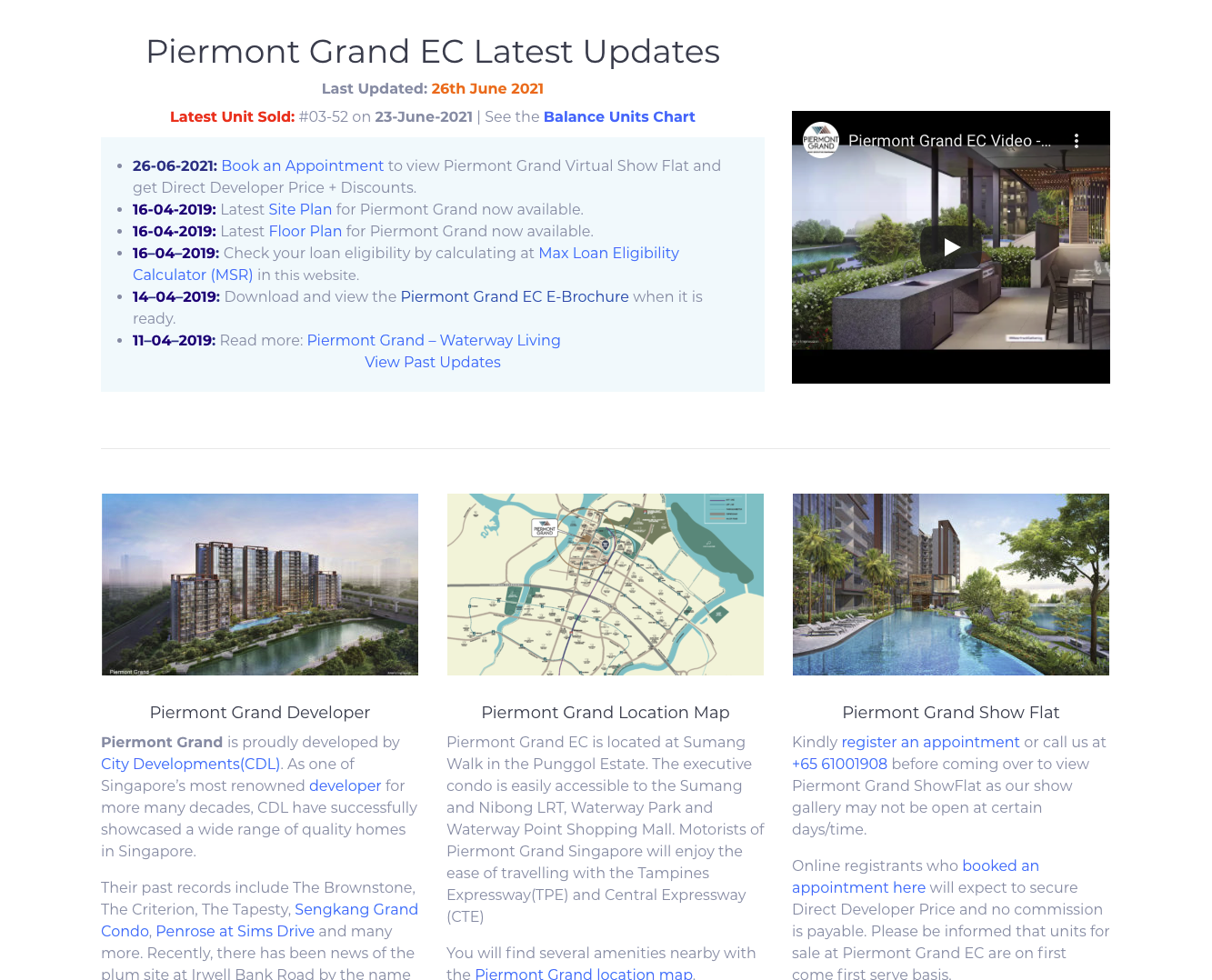
It’s usually a huge mass of words – which is not a pleasant sight. These are purposely done (it’s called keyword stuffing) so that the website is able to rank better on Google.
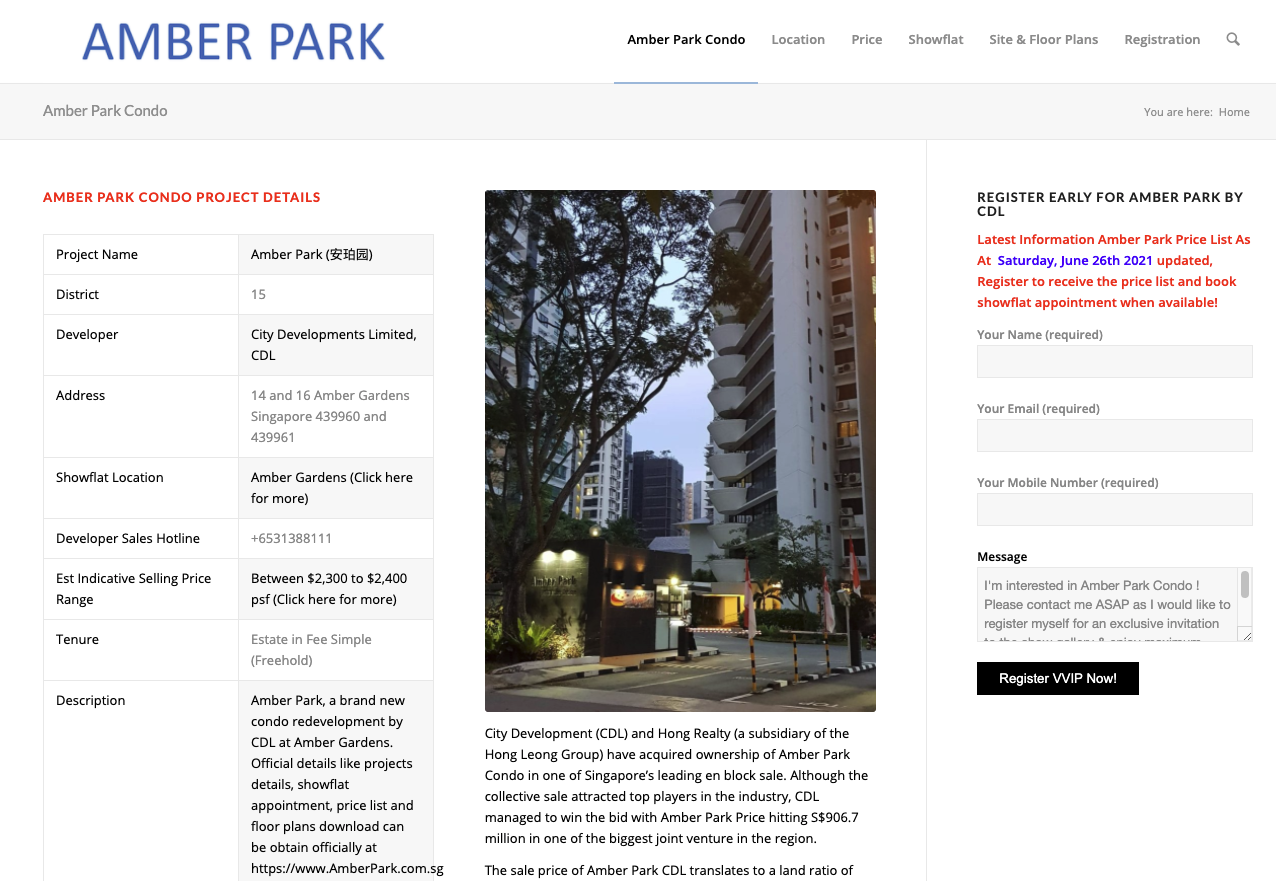
Not the prettiest site out there, is it? Especially for a luxury property like Amber Park.

New Launch Condo ReviewsAmber Park Review: 32,500 Sqft Rooftop Facilities Perched 22 Levels Up
by Matthew KwanExample 3: Look out for pricing
Developers tend to not display pricing on their official sites as the site is used to showcase the property in all its glory. Again, this is in contrast to the “official” sites as the main tactic is to draw you in with prices.
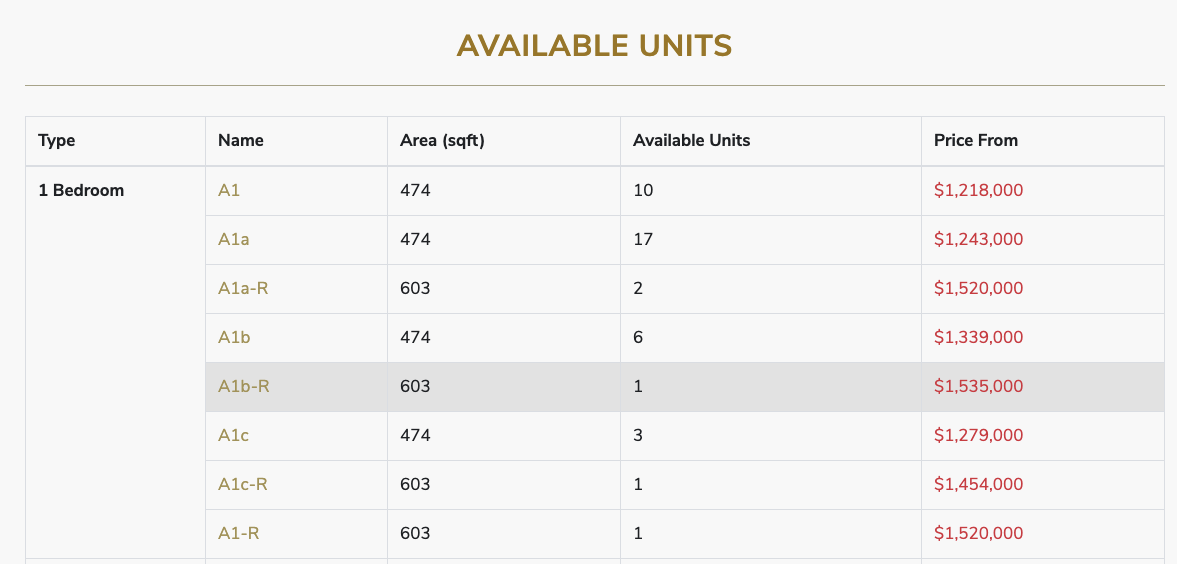
These “official” developer sites will usually display the prices on the first page. Or worse still…
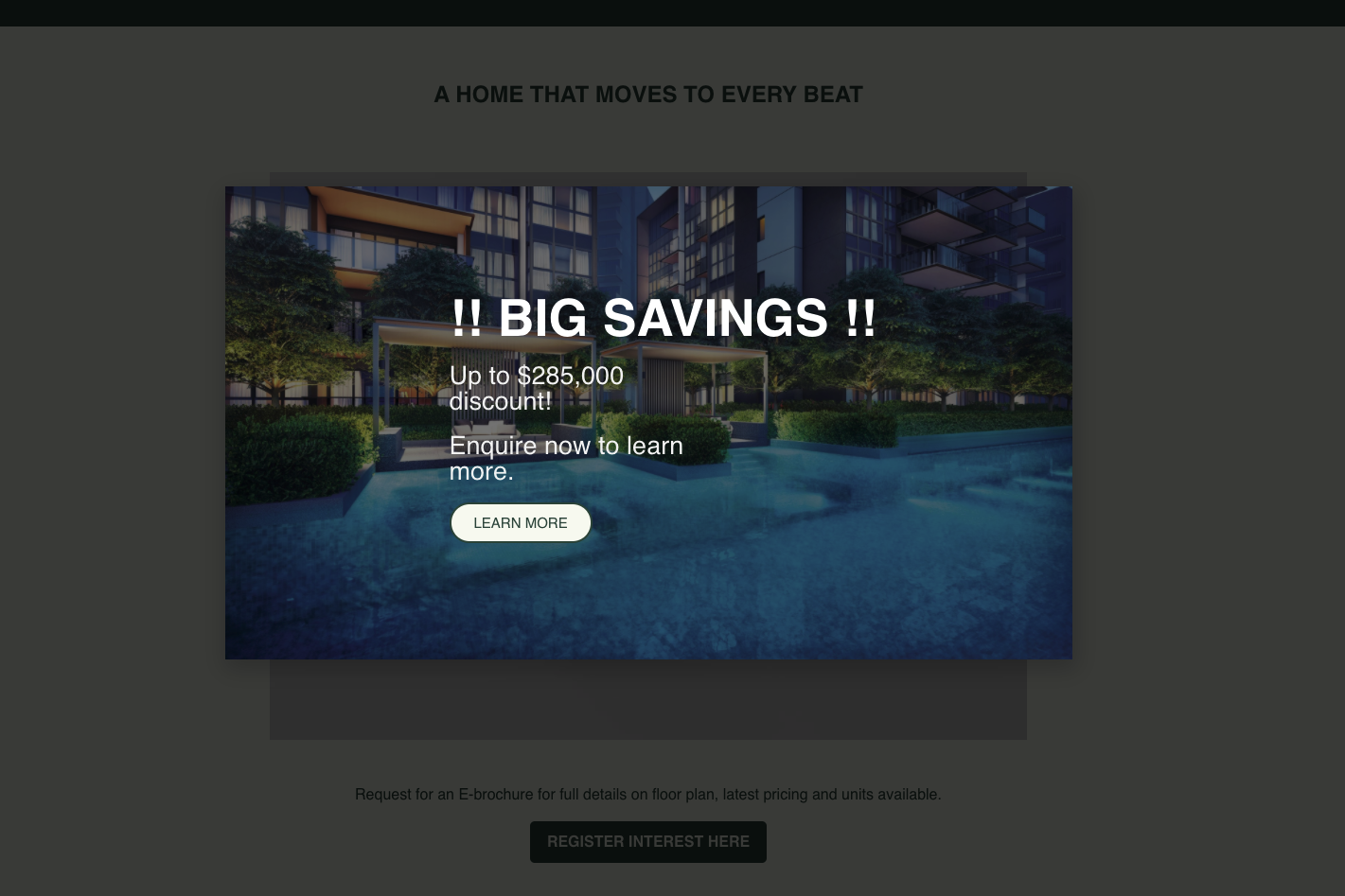
…in some cases, you might be bombarded with popups of savings as well. This is a big tell-tale sign that it is not the real site, as developers would almost never do this.
In addition, faux sites often like to advertise different payment schemes, such as the availability of Deferred Payment Schemes (DPS), or raise benefits regarding stamp duties (e.g., no ABSD for upgrading to an EC). Official developer sites will never do this.
Example 4: Look for the email
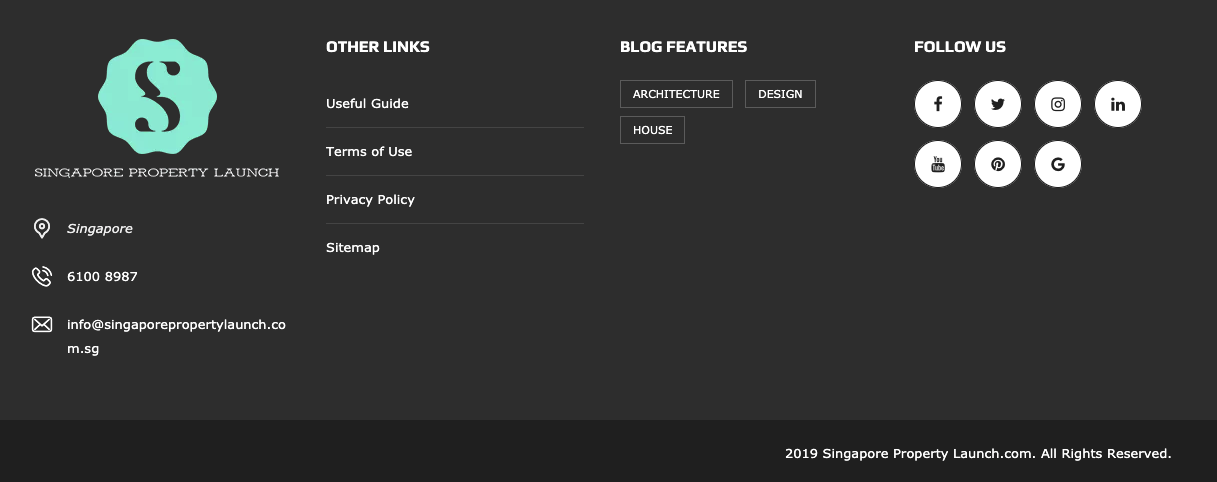
Faux sites often provide email addresses that go to their specific domains, such as mail@piermontgrandec.com.sg or sales@thepiermontgrand.com.sg. The actual address for CDL is enquires@cdl.com.sg (in general, if you don’t see the developer’s name in the email address, it’s probably not a real “official” site).
Example 5: Look for the contact number
To be doubly sure, look at the contact number as well for the site. Most of the “official” developer sites will have a contact number that starts with 6100.
Why?
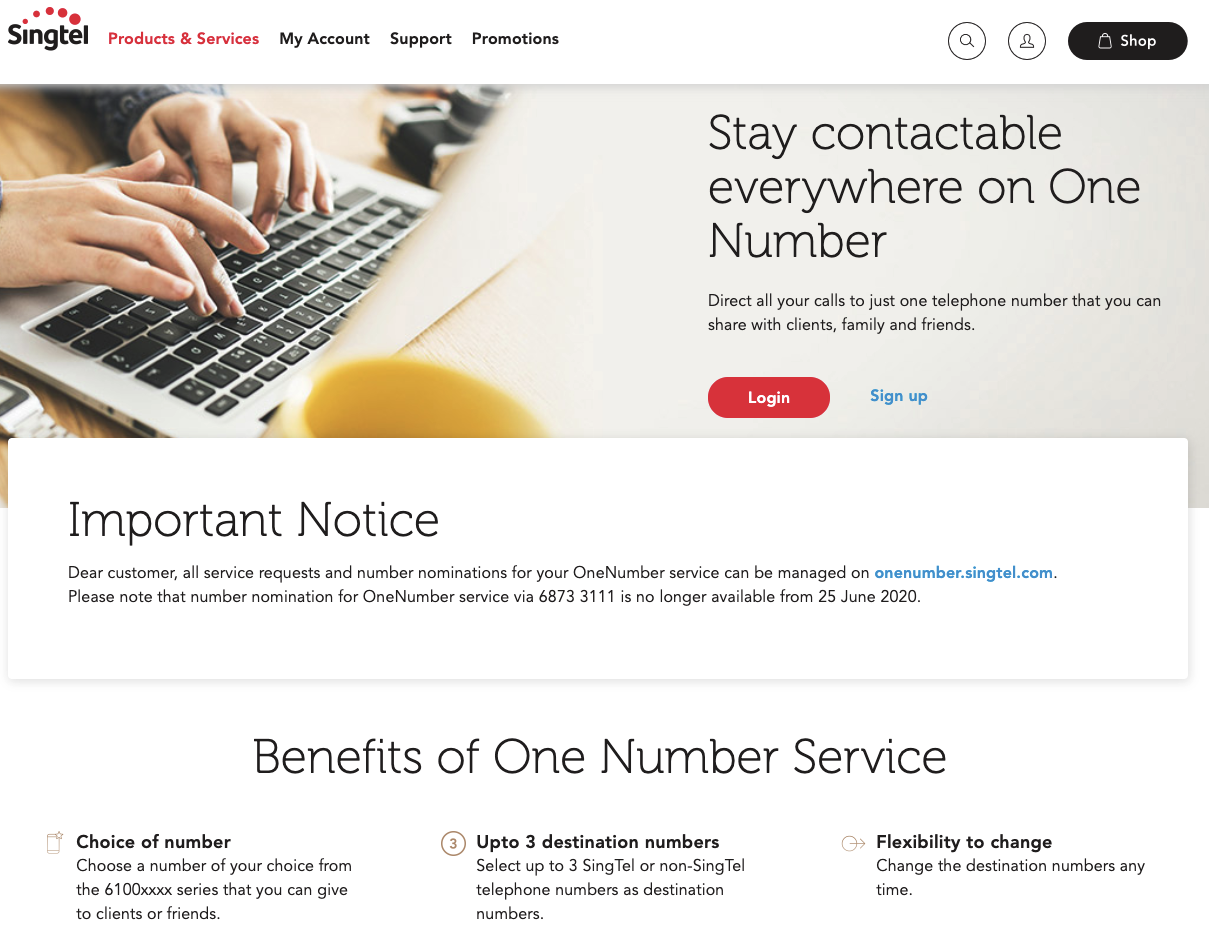
It’s quite ingenious really. Numbers that start with 6100 is part of the One Number service provided by Singtel. This service allows calls to be routed to a salespersons number, so different sales people can be in charge of the account on different days.
Another easy way to check would be to Google the number.
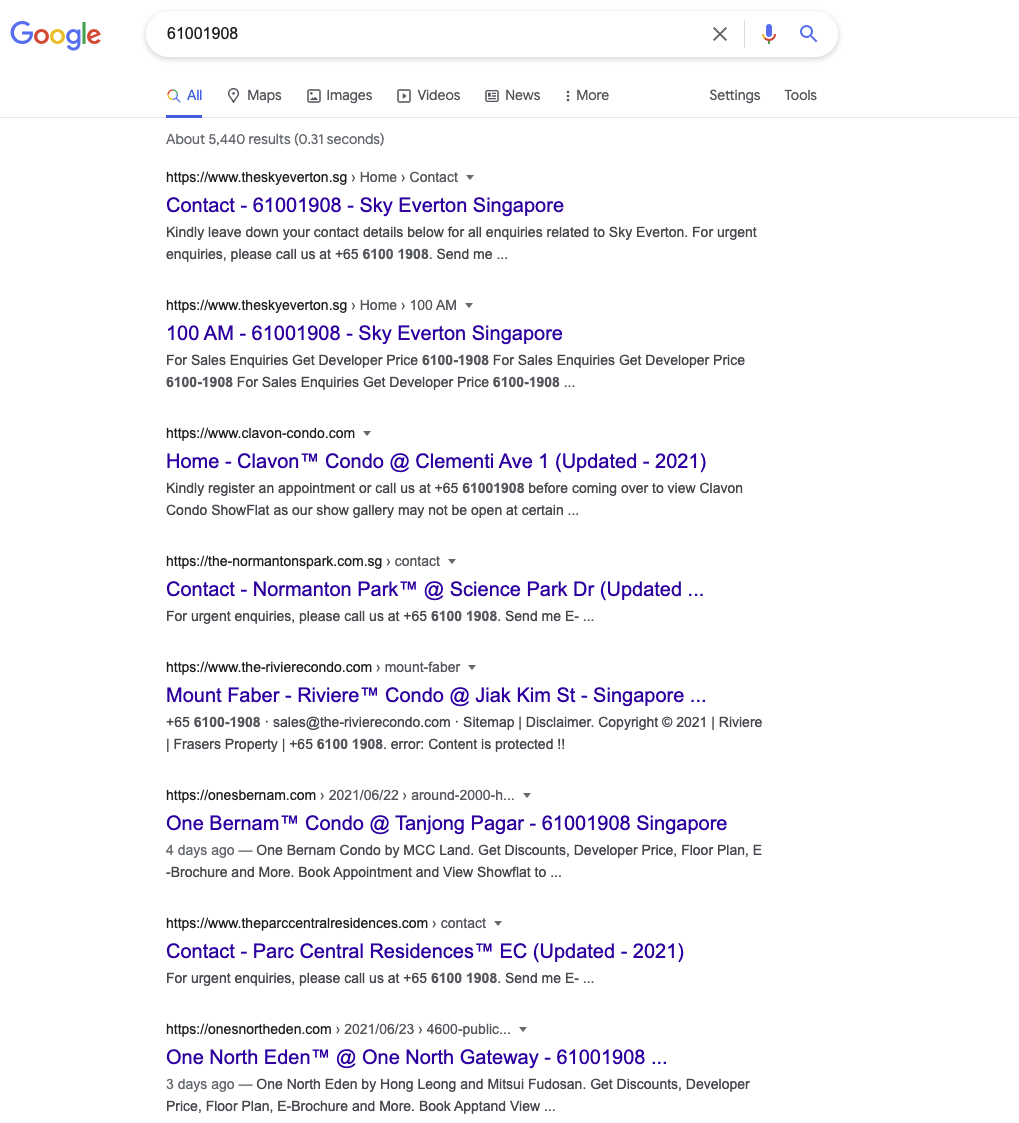
You’d see that the number will be used on various “official” developer sites. Obviously, a developer would never do this, as these are all developments by different developers.
Which leads to our next point.
Example 6: Look out for mentions of other developments
Faux sites often mention other developments, which CDL doesn’t do on official project pages. For example:

CDL wouldn’t detract from Piermont Grand by mentioning and linking other projects on the official site (even if it’s their own).
Example 7: Look at the privacy policy
Finally, if all else fails and the “official” developer site has passed all the tests but you have a sneaky feeling something is still dubious about it – there is one last fail-safe.
Have a look at the site’s privacy policy.
In the case of the “official” developer sites, you’d find that the privacy policies are generic, and will not contain the name of the developer at all. Instead, it would usually be named as the domain name of the site, which is totally unlike what a genuine developer site would showcase.
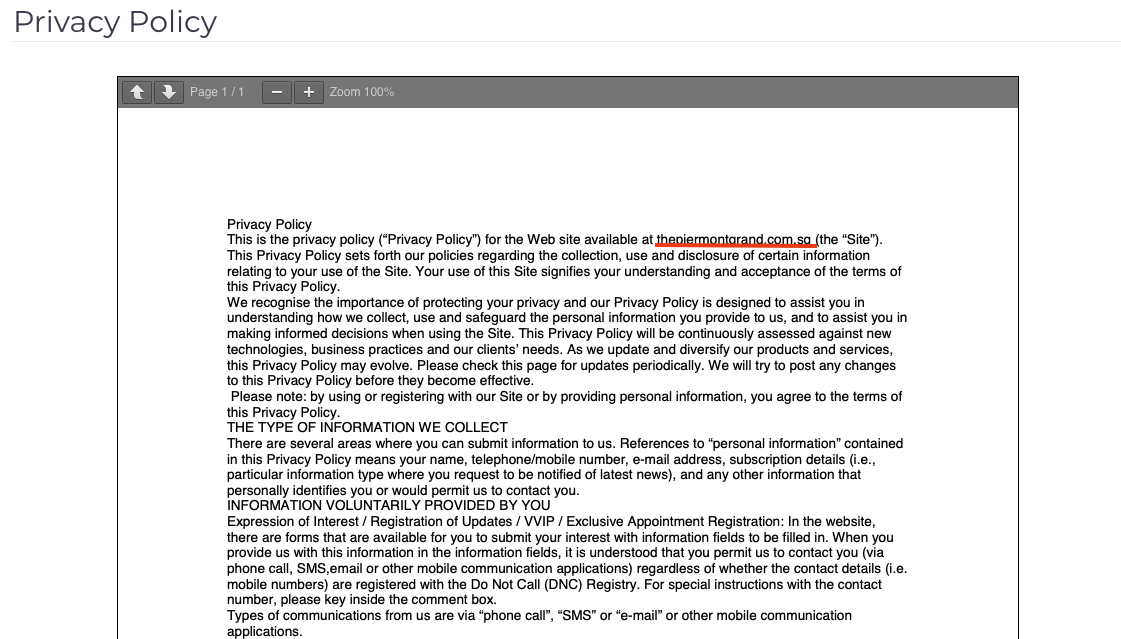
Let’s compare this to a real developer site:
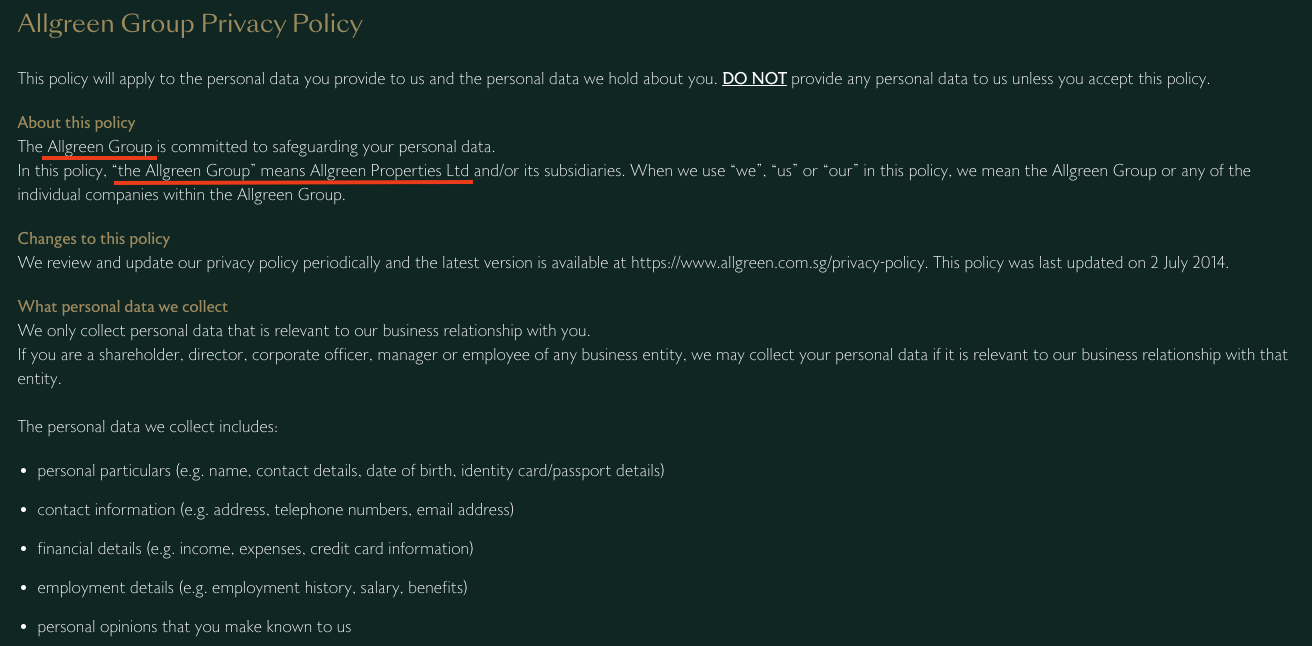
A look at the privacy policy for a real site will always show the developer name or company name.
When in doubt, search the developer’s name, not the project name
The developer’s official site will usually have a link to the (real) project site. So if you know the development is by CDL or Far East Organization, search for those developers’ names instead.
To conclude, this is really a grey area, and there’s nothing criminally wrong with sites such as these – as long as you are aware of what you are getting into. If we were to be positive about it, sometimes these sites can even be a useful place to look at floorplans and more information that often even the official developer sites may not be showcasing.
The problem really comes in when buyers are not aware of how things work and are under the assumption that they are working with the official developer sales team. We hope that this article serves as a guide to making an educated decision on your next steps in your property journey.
And if you want a more third-party, insightful review of properties, check out our in-depth look at new and resale properties alike on Stacked. We’ll also provide you with news and updates on the Singapore private property market, as it unfolds.
At Stacked, we like to look beyond the headlines and surface-level numbers, and focus on how things play out in the real world.
If you’d like to discuss how this applies to your own circumstances, you can reach out for a one-to-one consultation here.
And if you simply have a question or want to share a thought, feel free to write to us at stories@stackedhomes.com — we read every message.
Ryan J. Ong
A seasoned content strategist with over 17 years in the real estate and financial journalism sectors, Ryan has built a reputation for transforming complex industry jargon into accessible knowledge. With a track record of writing and editing for leading financial platforms and publications, Ryan's expertise has been recognised across various media outlets. His role as a former content editor for 99.co and a co-host for CNA 938's Open House programme underscores his commitment to providing valuable insights into the property market.Need help with a property decision?
Speak to our team →Read next from Property Advice

Property Advice We Sold Our EC And Have $2.6M For Our Next Home: Should We Buy A New Condo Or Resale?

Property Advice We Can Buy Two HDBs Today — Is Waiting For An EC A Mistake?

Property Advice I’m 55, Have No Income, And Own A Fully Paid HDB Flat—Can I Still Buy Another One Before Selling?

Property Advice We’re Upgrading From A 5-Room HDB On A Single Income At 43 — Which Condo Is Safer?
Latest Posts

New Launch Condo Reviews What $1.8M Buys You In Phuket Today — Inside A New Beachfront Development

Singapore Property News Taking Questions: On Resale Levies and Buying Dilemmas

Overseas Property Investing This Singaporean Has Been Building Property In Japan Since 2015 — Here’s What He Says Investors Should Know




































1 Comments
Hi Ryan. Ash, Property Agent here. Does Stacked Homes market New Launches as well? I believe you have a team of real estate agents too, right?